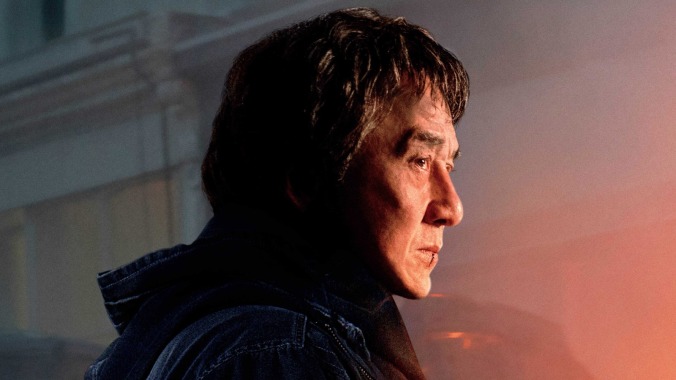Jackie Chan gets deadly serious in The Foreigner

The Foreigner is a good, lean cut of meat—in other words, a typical Martin Campbell movie, expeditious and cold-blooded in its cross-cut, cloak-and-dagger plotting and violence. A bomb explodes into a cloud of black smoke and glass, leaving 12 dead bodies in London’s posh Knightsbridge boutique district and scrambling various minor characters (journalists, political bigwigs, Scotland Yard officers) in search of information about an unknown Irish republican splinter group that calls itself “the Authentic IRA.” That’s when Liam Hennessy (Pierce Brosnan, who debuted as James Bond in the Campbell-directed GoldenEye), the deputy first minister of Northern Ireland, enters the picture. He’s a shrewd political operator—the kind of character American audiences are used to seeing in municipal and state-level politics, but not in terrorist-chasing thrillers. The guy is part wheeler-dealer, part guerrilla, and a dead ringer for Gerry Adams, the real-life leader of the Irish nationalist party Sinn Féin.
Adams, er, Hennessy, is a former Provisional IRA leader from the bad old days who’s shifted smoothly into the mainstream, and he knows an opportunity when he sees one. The back-channel negotiations begin: the identities of the culprits in exchange for official pardons for 40 IRA members. Never mind that no one will even admit to having heard of the Authentic IRA before the bombing. Besides, Hennessy has a more pressing problem—some crank named Quan (Jackie Chan, in his glummest role), a sixtysomething Hoa immigrant who lost his daughter in the attack and hasn’t left Hennessy alone since he saw him talking about his IRA past on the news. It’s easy enough for the growling politician to dismiss Quan when he’s just a nuisance barging into his office. But then come the bombs, made with match shavings, cigarette papers, and bathtub nitroglycerin. Quan wants only one thing, scrawled in a note he leaves with one of his explosive contraptions: “Names.” Who does this jerk think he is?
Before long, this unassuming man with a murky past is laying siege to Hennessy’s country house, living like Rambo in the nearby woods, setting tripwires, fighting off armed guards with kicks and slashes, foiling every attempt to smoke him out. It’s the stuff good, cynical pulp thrillers are made of—the characters’ veneer of neoliberal civility cracking into tribalism and wartime reflexes as they try to deal with the situation in-house in a complex sequence of clean-ups, cover-ups, and secret agreements. Quan is a one-sided character, but he makes the maneuvering literal: He moves fast, shimmying and slipping through some of the best and simplest set pieces of this latter-day phase of Chan’s career. Campbell’s approach to directing action is high-speed, low-drag, honed in a career of TV procedurals, low- to mid-budget thrillers, Zorro, and Bond; Casino Royale is his signature work, but The Foreigner hearkens back more to his classic BBC miniseries Edge Of Darkness (later remade by Campbell as a Mel Gibson movie), another self-destructive revenge scenario with a grieving father and geopolitical baggage. He’s not a humorless director, but the shocking suddenness of the violence makes for bleak punctuation.
But then the whole thing is bleak-looking, with its businesslike mise-en-scène, winter color palette, and alienating Cliff Martinez score. (It’s one of the more credible recent retro synth soundtracks, not unlike Martinez’s work on The Knick.) The blunt, airport-paperback script—adapted by David Marconi (Enemy Of The State) from a Stephen Leather novel with an even worse title, The Chinaman—scatters its subtexts. But it seems to have something (maybe not much, but still something) to say about the conflict between a modern, multicultural Britain and older, unresolved frictions. Here, after all, is a cat-and-mouse game between two former bombers who tried to become respectable, with daughters around the same age; we learn that Quan became a naturalized British citizen in the mid-1980s, just as Hennessy was starting to remake himself as a mainstream peace-maker. The duplicity of the characters—Hennessy’s family, his much younger mistress, his old IRA buddies—greases the plot. For his next film, Campbell should try tackling a Donald E. Westlake adaptation.